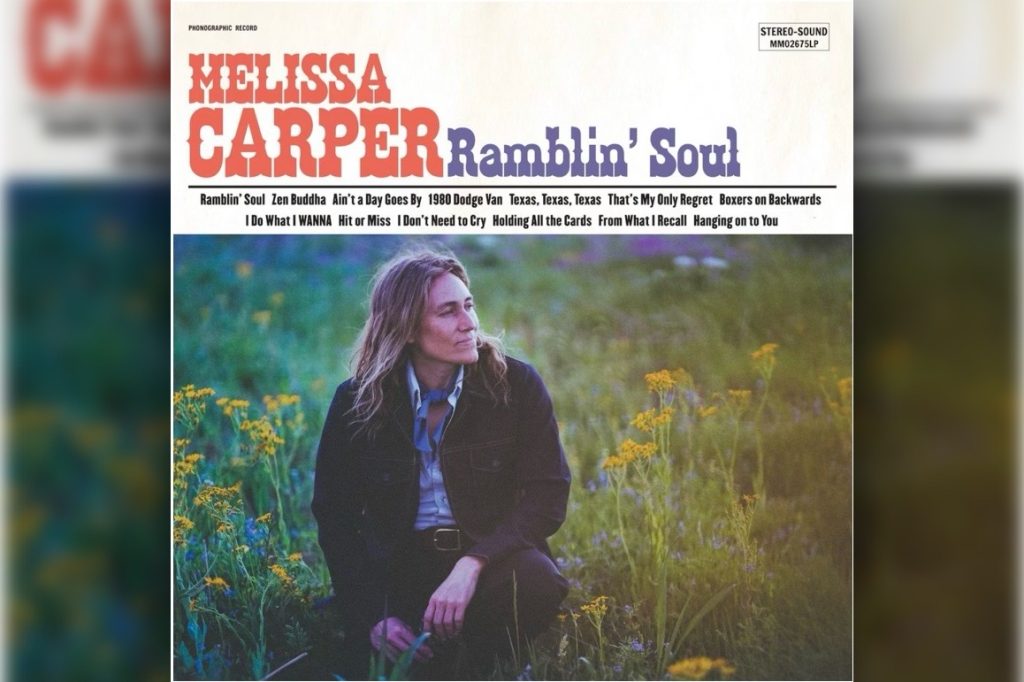Album Review: Melissa Carper Follows Her Own Compass on the Free Spirited ‘Ramblin’ Soul’
By Richard Marcus

Mellisa Carper’s Ramblin’ Soul is a declaration of independence drawn straight from the artist’s soul. While the title track of the album depicts a person whose life is tied to the road, the “Ramblin'” depicted over the course of the album isn’t confined to physical travel. We hear an artist who doesn’t give a damn what people think of her, what kind of music she plays, or what she actually sings about. Carper is the epitome of the free spirit – ramblin’ in whatever direction her muse and her inclinations conspire to take her.
This translates into an album of wide musical range, from old-time Loretta Lynn and Patsy Cline style tearjerkers (“That’s My Only Regret,” “I Don’t Need to Cry”), to Dixieland-jazz influenced swing numbers, all the way up to rockabilly influenced, rip-out-the seams-of-my-jeans dance tunes. Along the way, Carper makes pit stops for a Texas two-step (“Texas, Texas, Texas”), a bit of country blues, and a few moments of just plain silliness, (“Boxers on Backwards”).
What grabs you right from the onset is just how much fun she’s having while making this album. Of course, she’s been doing this pretty much all of her life, having started out touring with her family before pursuing her own career… one would hope she likes what she’s doing. Yet there are plenty of musicians who have similar histories, but lack her infectious ebullience.
Through her music, Carper comes across as a woman who delights in being alive and revels in every experience of her existence, even the ones that break her heart. She sings with equal passion about a beloved vehicle’s demise, (“1980 Dodge Van”) and the end of a relationship, (“That’s My Only Regret”). Which doesn’t mean she trivializes the latter, but rather, everything is kept in perspective.
The van in question in “1980 Dodge Van” was not only her first vehicle—and her first taste of independence—but it was also a gift from her parents and happened to be the van her family had toured in when she was younger. Suffice to say, there was a great deal of personal history wrapped up in it. So while the song might seem like a simple tune about a car, as with all the songs on this album, the subtext is what reveals their substance.
The track that precedes “1980 Dodge Van,” entitled “Ain’t a Day Goes By,” tells some of that story. As she explains in notes accompanying the album, she wrote the song back in 2014 after the death of her beloved dog. Carper’s canine companion had by her side when her parents passed and her brother’s personality became altered beyond recognition from mental illness. So when her pooch passed—her sidekick through all that trauma—it cracked her open. “The grief just started pouring out at that point,” she says.
“Ain’t a Day Goes By” is simultaneously beautiful and heartbreaking, especially with the context revealed. Carper transmits her grief without wallowing in it, making it all the more powerful. There’s a fine line between self-indulgence and true expression of feelings and she straddles it with delicacy and grace.
Carper’s music, and this track in particular, are so without artifice it feels like they spontaneously sprouted without human interference. It’s as if she’s blessed with an organic garden out back where songs just pop from the ground, fully formed. I think we’d all like to know what kind of fertilizer she’s using.
At the heart of every superior album usually lies one song which encapsulates the spirit of the entire recording; in this case, it’s Carper’s cover of Odetta’s “Hit or Miss”. No doubt: Carper puts her all into everything. But on this track, it seems as if she’s somehow gone even a little deeper.
You might even say she’s turned it into an anthem for this generation. It’ll stop you in your tracks. Queer people, and anyone marginalized for that matter, will have no problem identifying with these lyrics: “But now I see/I gotta be me/Ain’t nobody just like this/I gotta be me/Baby hit or miss, baby hit or miss, hit or miss/Ain’t nobody just like this/I gotta be me”.
Here, Carper compels us to listen, using Odetta’s anthem of independence to make us understand the unique and wonderful qualities that exist within all of us (most of us?) just as we are. Maybe others have said this sort of thing to you before, but Carper delivers it in such a way that makes it more believable. From a stranger.
All across Ramblin’ Soul, Carper demonstrates versatility within her own genre, making herself suitable for almost any venue. We can imagine her fronting of a swing band as her audience dances by under the mirrorball just as easily we can see her rocking out in a honkytonk or crooning at a barn dance in a small town. She effortlessly slides between styles, travelling along various paths taken by American music since the 1920s.
As “I Do What I Wanna” clearly conveys, Carper sings and plays what strikes her fancy. Ramblin’ Soul is a beautiful stroll through the history of Americana, sung and played by a true mistress of the form. It rings with a bell of authenticity that’ll make your heart sing.
Richard Marcus has been writing about music, films, and books since 2005. He’s published three books commissioned by Ulysses Press. He currently edits the Books section at Blogcritics.org and is a regular contributor to Qantara.de. He lives in Kingston, Ontario Canada with his feral accomplice and their cat.